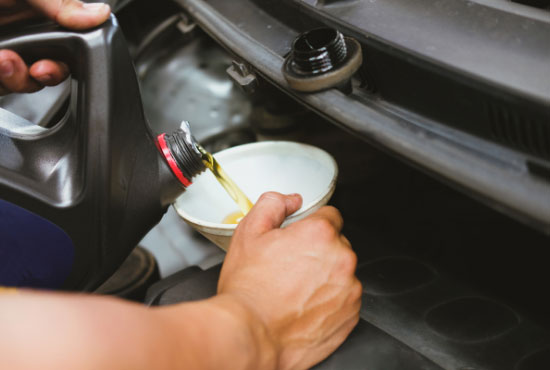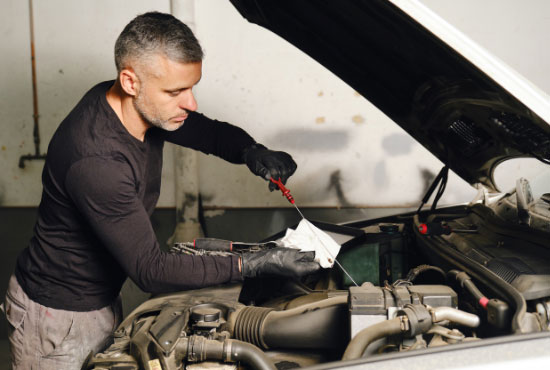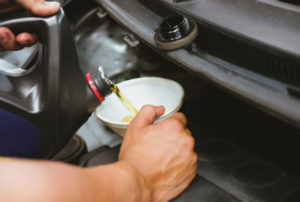I am often asked if Jeep Wranglers require synthetic oil, and if I use synthetic oil in my own Jeep.
As a mechanic and car enthusiast, I will tell you that all vehicles need synthetic oil.
The older model Jeep Wrangler did not require synthetic oil but later models do require synthetic oil to be used.
Why Should I Use Synthetic Oil?

To put this simply you should use synthetic oil because they are better for the vehicle. Conventional oils do not provide the same level of lubrication that synthetic oils can provide. That is the main reason why people using conventional engine oils have to change their oil more often than people who choose to use synthetic oil in their engines.
Why Synthetic Oil is Better
- Synthetic oil is more chemically stable than the conventional
- Synthetics do not oxidize and acidify as quickly as conventional oils do
- Synthetic oils take longer to break down and lose their protective qualities
- Synthetics help to reduce deposit buildup
- They help to combat sludge and prevent sludge formation
- They are more protective against higher temperatures
- They are more effective at reducing wear
- They help to keep your engine cleaner
- They maintain a more even and effective flow in colder temperatures
- They increase the horsepower of the engine
Oil brand
There are a host of excellent oil brands on the market today. You also have the choice of conventional, synthetic, or synthetic blend oils.
Synthetic Blends
Synthetic blends give you the best of synthetic and conventional motor oils. These oil types have only about 30% synthetic oil and the remainder is conventional.
They are better oil than conventional because they can reduce the rate of oxidization and they lubricate slightly better. They do not break down as quickly, and they can withstand slightly higher or lower than average temperatures.
Fully Synthetic
These oils are less refined so the molecules in them are more uniform and they have a lot fewer impurities than conventional blends have.
Fully synthetic oil will keep your engine cleaner and make your engine last longer than the other oil varieties.
Often people think that synthetic oils are very expensive. If you think about the fact that conventional and synthetic blends are recommended to be changed every 3,000 to 5,000 miles and fully synthetic oils need changing every 7,000 to 20,000 miles you will see that the cost of the oils is not that much greater. In some instances, a vehicle using synthetic oil will only need an oil change once a year.
Major Oil Brands:
- Pennzoil
- Quaker State
- Valvoline
- Formula Shell
- Shell Rotella
3000 Mile vs 5000-Mile Oil Change Intervals
Older vehicles that relied strictly on conventional oil in their engines had to have their oil changed every 3,000 to 5,000 miles. The number of miles that a vehicle could go between oil changes was dependent on the location and the way the vehicle was driven.
A vehicle that was driven seldomly, and on paved streets only could stand to have the oil changed every 5,000 miles with no bad consequences.
A vehicle that was driven on a daily basis, or one that was taken on off-road adventure trips had to have the oil changed every 3,000 miles. If the vehicle was located in a very cold temperature climate or an extremely hot temperature climate then the oil had to be changed every 3,000 miles.
The 3,000 and 5,000 miles between oil change controversy is not relevant any longer. The newer engines are suggested to be operated using fully synthetic oil. Now drivers can go a lot farther before they need to change their oil.
Most passenger trucks and cars are recommended to have their oil changed every 7,500 miles or every six months. This assumes you will be doing normal day to day travels to and from work, school, home, and church.,
If you drive more miles than average or you like to drive off-road with your vehicle then most manufacturers would recommend you revert back to changing your oil every 5,000 miles.
The length of time between oil changes really does depend on how you drive your vehicle. If you put a lot more miles on your vehicle than the average 15,000 per year then change your oil more frequently. The longer you drive the hotter the engine gets and that means the hotter the oil and other fluids in the engine get. If you travel a lot then keep your oil changed for your engine’s protection.
If you live in town and rarely drive more than twenty miles in one distance then change your oil less often. You likely are not driving far enough or long enough in a day to cause the oil to get excessively hot.
If your vehicle is still under warranty then read the owner’s manual carefully. You will find a recommended schedule for oil changes. As long as the vehicle is under warranty make certain you change the oil according to those recommendations and make sure that you use the exact oil type that the manufacturer recommends.
If you deviate from using the reco9mmended oil or making oil changes according to the recommended schedule you can void your warranty.
Combustion Contaminants
There are six products of combustion created by burning gasoline.
They are:
- Lead
- Carbon monoxide
- Sulfur oxides
- Nitrogen oxides
- Ground-level ozone
- Other particulate matter or particle pollution
These contaminants cause your engine oil to get dirty and be less lubricating. Synthetic oils are not influenced as greatly by these contaminants and they do less damage to your engine.
Best Oil for Jeep Wrangler
Mopar oil created for Jeep vehicles is made by Pennzoil. The common oil recommended for a Jeep is the 5W-20 unless you drive in extreme conditions and then the 5W-30 is recommended.
Things You’ll Need For An Oil Change

If you plan to do your own oil change then you will need to gather the following items.
Tools:
- 3/8” socket wrench to remove the drain plug
- Container to drain the used oil into
- Oil filter wrench
- A funnel
- Gloves for your hands, latex will work great
- Jack and jack stand if you do not have enough clearance to get under the vehicle
- A cloth to wipe oil from the dipstick when you check it and to wipe the oil from your hands
Materials Needed
- 5 to 7 quarts of oil (The owner’s manual will tell you the exact number of quarts your engine requires. Check this before you start the oil change.)
- Oil filter
Pro Tips:
- When changing oil the five-quart economy-size jugs are better priced than the single quart containers. The bigger containers are also heavy and it is hard to pour the oil out of them and into the engine. The smaller one-quart containers are also easier to store and carry with you if you do not use all of the oil in them.
- Read your owner’s manual
- Having your oil changed at the dealership or by a certified technician will ensure that you do not void the warranty on your vehicle
- Keep accurate records of your oil changes so you will not have to guess how many miles or months it has been since the last one.
- Remember that less expensive or generic brands of motor oil are normally cheaper because they are of lesser quality. If the quality of the oil is less than the protection it provides you will also be less. If you have to change the oil more often you are not saving any money by using the cheap stuff
Frequently Asked Questions
Can I Use 5w-30 in My Jeep Wrangler?
You can use 5W-30 but should use this when the temperatures will be very cold or very hot. Under normal conditions, 5W-20 is the recommended oil.
When Is It Better to Use 5W-30 Instead of 5W-20?
When your vehicle is going to be subjected to extreme hot or cold temperatures.
Will Using Pennzoil Synthetic Void The Warranty On My Jeep?
No. Pennzoil synthetic is actually recommended by Chrysler, Jeep, Dodge, and Ram as oil of choice.
Final Thoughts
Change your oil to keep your motor clean and lubricated. How often you change the oil will depend on how you drive, where you live, and the oil you select. It really is worth the investment to buy the higher-priced synthetic oils and give your engine that added protection.
More Jeep Wrangler Related Articles>>
1. What Temperature Should A Jeep Wrangler Run At?
2. Reasons Why A Jeep Wrangler May Not Start
3. Jeep Wrangler White Smoke on Startup

